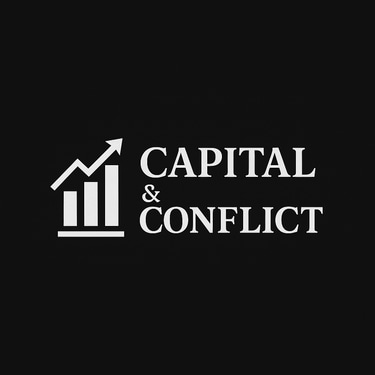Switzerland Reels as Trump Slaps 39% Tariff on Exports
MACROECONOMIC
Tom Watkins
8/17/20253 min read


Switzerland, fabled for its neutrality, was left reeling earlier this month after President Trump announced a 39% tariff on Swiss exports. This figure was a big increase on the original 30% mooted on ‘liberation day’ and one that was the highest figure among OECD countries.
President, Karin Keller-Sutter was lambasted by Swiss officials and the media for such a heavy figure being implemented. The tabloid, Blick, said that this was the country’s greatest defeat since 1515, when it lost a battle against the French. A key reason for Trump imposing such a high figure was that he remained frustrated at the countries Switzerland’s $39bn surplus trade with the US and the fact that Alpine, the wealthy car brand, had not expanded further into the country. Yet, a key reason for the countries negative trade balance is not because of economic mismanagement but the fact that gold often passes through Switzerland for refining and trade.
The implementation of high tariffs is likely to have large ramifications for various business sectors within the country. The US is a huge market for Swatch, high end watches such as Rolex and Patek Phillipe and high-end chocolate and cheeses. However, despite the US being the largest single market for Swiss pharmaceuticals such as Roche and Novartis, for now these will be exempt from the 39% rate.
The long-term effects of the tariffs are hard to anticipate with such little precedent for previous measures being enacted. On a micro level it means that Swiss products will become significantly more expensive in the US, not only in comparison with US goods but with other exporters who have more favourable customs agreements. This will likely lead to falling demand for these products. More broadly, speaking to Reuters, Hans Gersbach, an economist at KOF Swiss Economic Institute at ETH, at Zurich University said it would result of a GDP loss of “0.3% and 0.6%.” This would not necessarily lead to the country entering a recession but could lead a to period of prolonged stagflation.
Despite pharmaceuticals currently being exempted from the tariff, President Trump has consistently retorted that he is committed to bringing down the price of these goods for US consumers. He announced that he will reveal his plans for reducing these prices in 60 days. This uncertainty coupled with the already high tariff rates for other goods will exert significant pressure on the Swiss economy given how much pharmaceuticals make up GDP. The European country has long been a bastion of economic steadiness and productivity, averaging nearly 2% GDP growth over the past 25 years, because of its low public debt and fiscal surplus. A contrast from many of its continental peers forever battling low fiscal headroom.
A GDP contraction is likely to increase monetary pressure on the Swiss National Bank. The SNB cut interest rates in Mid-June from 0.25% to 0%, citing deflationary pressures. In May, Swiss consumer prices dipped -0.1% year on year, a deflationary environment can cause households and businesses to delay spending and investment. Bringing interest rates down to such low levels, is an incentive to kickstart consumption and investment. Additionally, the strength of the Franc coupled with other ECB banks cutting rates, meant it was logical to make the currency less attractive and ease upward pressure.
Switzerland remains an attractive destination for investors and as a place of work. It’s a haven for gold and real estate - 93% of investors view Swiss real estate as attractive for 2025 according to EY. This retained confidence allows the country to cautiously position itself amid the global uncertainty and tariff experiment. The shock and political turmoil inflicted is unnerving, but Switzerland is rational and will likely stick to their long-term economic planning. Despite US economic outlook continuing to remain resilient with Trump trying to rearchitect global trade, the longer-term picture is less clear. Negotiations between the two countries are set to continue, in attempt for Switzerland to rehash a more favourable agreement and recognising their position as a strong economic player.
Insights
Exploring political risk and financial market impacts. This is not financial advice.
Analysis
Trends
© 2025. All rights reserved.
